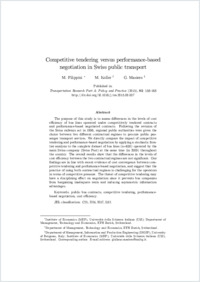Competitive tendering versus performance-based negotiation in Swiss public transport
- Filippini, Massimo Istituto di economia politica (IdEP), Facoltà di scienze economiche, Università della Svizzera italiana, Svizzera
- Koller, Michael Department of Management, Technology and Economics, ETH, Zurich, Switzerland
- Masiero, Giuliano Istituto di economia politica (IdEP), Facoltà di scienze economiche, Università della Svizzera italiana, Svizzera
-
2015
Published in:
- Transportation research part A: policy and practice. - Elsevier. - 2015, vol. 82, p. 158-168
English
The purpose of this study is to assess differences in the levels of cost efficiency of bus lines operated under competitively tendered contracts and performance-based negotiated contracts. Following the revision of the Swiss railways act in 1996, regional public authorities were given the choice between two different contractual regimes to procure public passenger transport services. We directly compare the impact of competitive tendering and performance-based negotiation by applying a stochastic frontier analysis to the complete dataset of bus lines (n=630) operated by the main Swiss company (Swiss Post) at the same time (in 2009) throughout the country. The overall results show that the differences in the levels of cost efficiency between the two contractual regimes are not significant. Our findings are in line with recent evidence of cost convergence between competitive tendering and performance-based negotiation, and suggest that the practice of using both contractual regimes is challenging for the operators in terms of competitive pressure. The threat of competitive tendering may have a disciplining effect on negotiation since it prevents bus companies from bargaining inadequate rents and inducing asymmetric information advantages.
- Language
-
- English
- Classification
- Economics
- License
-
License undefined
- Open access status
- green
- Identifiers
-
- RERO DOC 257490
- DOI 10.1016/j.tra.2015.09.007
- ARK ark:/12658/srd1318487
- Persistent URL
- https://n2t.net/ark:/12658/srd1318487
Statistics
Document views: 226
File downloads:
- Texte intégral: 219
